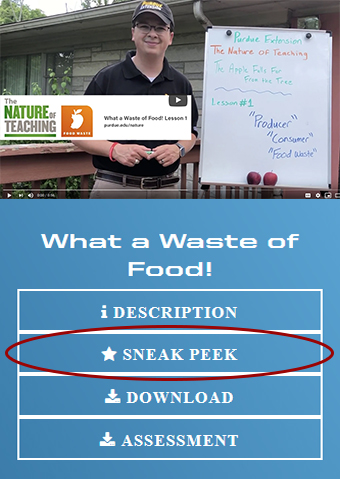 Purdue University - Extension - Forestry and Natural Resources
Purdue University - Extension - Forestry and Natural Resources
Got Nature? Blog
Join Purdue Extension fisheries expert Mitch Zischke and Purdue Extension – Ripley County extension educator Dave Osborne as they share about pond management, including how to create a management plan, getting things ready for spring, what to do about early season issues and more.
If you have any questions regarding trees, forests, wildlife, wood products or other natural resource topics, feel free to contact us by using our Ask an Expert web page.
Resources
Pond Management, Website, Purdue College of Agriculture
Pond University Podcast Series
Pond Management Plan Template, The Education Store, Purdue Extension resource center
Pond Fish Species Identification, The Education Store
Pond Fish Stocking, The Education Store
Fish Population Management, Website, Purdue College of Agriculture
Aquatic Plant Management, The Education Store
Ask An Expert, Playlist, Purdue Extension – Forestry and Natural Resources YouTube channel
Licensed Fish Hatcheries (PDF 100kb), Indiana Department of Natural Resources (IDNR)
County Resources for Ponds in Indiana, Purdue College of Agriculture
Feedback: Qualtrics survey
Mitch Zischke, Clinical Assistant Professor
Purdue Department of Forestry and Natural Resources
Dave Osborne, County Extension Director
Purdue Extension – Ripley County
Get ready to receive your weekly dose of natural resources information via a new podcast network called Natural Resources University. Purdue Forestry and Natural Resources’ Jarred Brooke hosts the new podcasts Habitat University.
 Brooke, a Purdue Extension wildlife specialist, is the co-host of Habitat University along with Adam Janke, an extension wildlife specialist at Iowa State University. The pair will discuss the science behind wildlife habitat management and how landowners and managers can use different habitat management practices to improve their land for wildlife. Brooke and Janke will be joined on the podcast by other wildlife specialists, wildlife biologists, researchers and landowners. The first episode of Habitat University is here: Habitat University. You can also follow Habitat University on twitter at www.twitter.com/Habitat_U.
Brooke, a Purdue Extension wildlife specialist, is the co-host of Habitat University along with Adam Janke, an extension wildlife specialist at Iowa State University. The pair will discuss the science behind wildlife habitat management and how landowners and managers can use different habitat management practices to improve their land for wildlife. Brooke and Janke will be joined on the podcast by other wildlife specialists, wildlife biologists, researchers and landowners. The first episode of Habitat University is here: Habitat University. You can also follow Habitat University on twitter at www.twitter.com/Habitat_U.
In total, Natural Resources University will include four science-based podcasts, covering different aspects of natural resource management. You can subscribe to the entire network, which will bring you a different podcast each week, or you can subscribe to an individual podcast, which will release one episode a month. Subscribe here: Natural Resources University
A full introduction to the Natural Resources University network team and to each podcast are available in this overarching episode: Episode 01 – Introduction to NRU.
The podcasts are categorized in four topics:
Deer University: Topics discussed include deer biology, ecology, and management to help landowners and hunters apply science to practical management objectives. Subscribe to Deer University: Deer University
Pond University: Conversations with aquatic scientists, landowners, and pond professionals will cover topics like pond habitat, fish stocking, vegetation control and pond construction. Subscribe to Pond University: Pond University
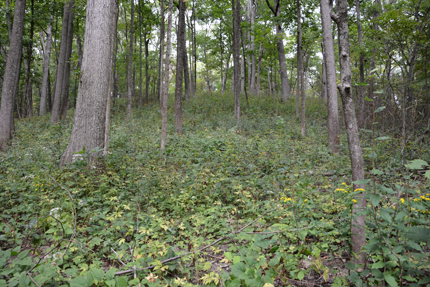 Fire University: Science-based podcast covering the latest research in fire ecology and how it relates to management of wildlife and plant communities. Subscribe to Fire University: Fire University
Fire University: Science-based podcast covering the latest research in fire ecology and how it relates to management of wildlife and plant communities. Subscribe to Fire University: Fire University
Habitat University: Discusses the science behind wildlife habitat management and how landowners and managers can use different habitat management practices to improve their land for wildlife. Subscribe to Habitat University: Habitat University.
The Natural Resources University podcast network, which is funded by the Renewable Resources Extension Act, is a partnership between the extension services at several land-grant universities, including Mississippi State University Extension Service, University of Florida Extension, Iowa State University Extension and Outreach and Purdue Extension.
Resources
Pond and Wildlife Management Website
Managing Your Woods for White-Tailed Deer, The Education Store, Purdue Extension resource center
A Pond Management Plan Template, The Education Store
Renovating native warm-season grass stands for wildlife: A Land Manager’s Guide, The Education Store
Megan Gunn, Recruitment and Outreach Specialist
Purdue Department of Forestry and Natural Resources
Jarred Brooke, Wildlife Extension Specialist
Purdue Department of Forestry and Natural Resources
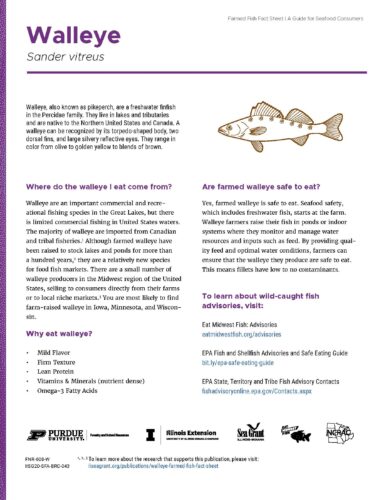 Seafood is a protein category that has many commercially and recreationally available options. Selecting seafood is more like shopping for fruits and vegetables than animal proteins. This publication is the first in a series of fact sheets that describe fish and shellfish produced in the Midwest region of the United States, where commercially available fish comes from, food safety, culinary characteristics, and cooking tips.
Seafood is a protein category that has many commercially and recreationally available options. Selecting seafood is more like shopping for fruits and vegetables than animal proteins. This publication is the first in a series of fact sheets that describe fish and shellfish produced in the Midwest region of the United States, where commercially available fish comes from, food safety, culinary characteristics, and cooking tips.
View other seafood publications and video resources as you place keywords in the search field located on The Education Store website.
Resources
Sustainable Aquaculture: What does it mean to you?, The Education Store, Purdue Extension resource center
Best Practices Guide for Charter Fishing and COVID-19, The Education Store
Pond Management: Managing Fish Populations, The Education Store
Indiana Pond Fish, Species Identification Card Set, The Education Store
Fish Cleaning with Purdue Extension County Extension Director, Got Nature? Blog, Purdue Extension – Forestry and Natural Resources
Amy Shambach, Aquaculture Marketing Outreach Associate
Purdue Department of Forestry and Natural Resources/Illinois Indiana Sea Grant Program
 Calling all teachers and parents: Do you need some new ideas on how to get students out in nature or teach them science lessons?
Calling all teachers and parents: Do you need some new ideas on how to get students out in nature or teach them science lessons?
We’ve got you covered with our Nature of Teaching program. We’ve created more than 40 sneak peek videos that introduce you to our lesson plans, offering a quick way for teachers and other K-12 leaders to view the lessons as well as the related activities.
Many of the lesson plans meet state specifications for Next Generation Science Standards and/or Core Standards, while also offering informal curriculum items and fun activities for all K-12 leaders.
The Nature of Teaching program offers three areas of formal and informal activity-based curricula centered around getting youth outside: wildlife, health and wellness, and food waste.
Sneak Peeks videos include topics ranging from producers, consumers and natural resources and food waste from farm to fork, to exploring nature with your senses and emotional vocabulary exploration, to trees of the Midwest and healthy water/happy home.
Subscribe to the Nature of Teaching YouTube Channel for more Wildlife, Food Waste, and Health and Wellness information.
Resources
Nature of Teaching Website
Nature of Teaching YouTube Channel
Nature of Teaching Program Receives Environmental Education Award, College of Agriculture, Purdue University
Resourceful Animal Relationships, The Education Store, Purdue Extension resource center
The Nature of Teaching: Food Waste Solutions, The Education Store
Benefits of Connecting with Nature, The Education Store
Rod N Williams, Professor of Wildlife Science
Purdue University Department of Forestry and Natural Resources
 The Nature of Teaching, a Purdue Extension signature program, was honored as the third place finisher in the central region for the Environmental Education Award presented by the National Extension Association of Family and Consumer Science (NEAFCS).
The Nature of Teaching, a Purdue Extension signature program, was honored as the third place finisher in the central region for the Environmental Education Award presented by the National Extension Association of Family and Consumer Science (NEAFCS).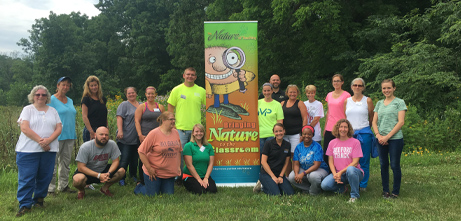 The Nature of Teaching team includes:
The Nature of Teaching team includes:
- Deb Arseneau, HHS Educator, Newton County
- Jarred Brooke, extension wildlife specialist
- Jay Christiansen, health and human sciences extension educator for Vigo County
- Robert Cordes, Maine Department of Inland Fisheries and Wildlife (MDIFW) wildlife special projects coordinator
- Molly Hoag, health and human sciences extension educator for Wells County
- Molly Hunt, health and human sciences extension educator for Delaware County
- Rebecca Koetz, urban ag/home horticulture extension educator for Lake County
- Tami Mosier, 4-H youth development extension educator
- Kelsie Muller, health and human sciences extension educator for Benton County
- Dr. Rod Williams, professor of wildlife science
- Brad Zitscke, Maine Department of Inland Fisheries and Wildlife (MDIFW) assistant regional wildlife biologist
Nature of Teaching
Nature of Teaching YouTube Channel
Transporting Food Waste, The Education Store, Purdue Extension resource center
Resourceful Animal Relationships, The Education Store
Benefits of Connecting with Nature, The Education Store
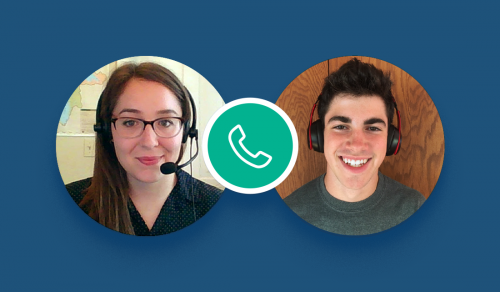 Illinois-Indiana Sea Grant (IISG): “I was 19 years old. I never even knew any of this stuff existed. I didn’t know I could be a scientist. I thought that was something way beyond what I could be,” said Susan Daniel, a Buffalo State College researcher who studies invertebrates that live at the bottom of the Great Lakes.
Illinois-Indiana Sea Grant (IISG): “I was 19 years old. I never even knew any of this stuff existed. I didn’t know I could be a scientist. I thought that was something way beyond what I could be,” said Susan Daniel, a Buffalo State College researcher who studies invertebrates that live at the bottom of the Great Lakes.
She was talking to students from Ellis Middle School in Elgin, Illinois, who had posed questions for her and a handful of other scientists taking part in a virtual session bringing these two groups together. These students in Holly Yee’s science classes had been studying the Great Lakes and the participating scientists are experts on the subject. They hail from the Environmental Protection Agency (EPA), universities and the Sea Grant program.
Illinois-Indiana Sea Grant (IISG) developed the Scientists to Students (S2S) program to connect students with Great Lakes scientists on board the EPA research ship, the Lake Guardian, via videocasts. While out on the lakes collecting samples, scientists visit classrooms virtually and talk with students about aquatic science, water quality monitoring, careers, and life on a ship. Since the program’s inception, over 25 scientists, 33 teachers, and more than 3400 students throughout the Great Lakes have participated.
This spring, due to COVID-19, as with most events, S2S videocasts needed to be rethought, if the program happened at all. Working with several teachers, IISG’s Kristin TePas and Allison Neubauer refashioned the get-togethers with everyone in their homes, both scientists and students alike.
“This has resulted in a fair amount of trial and error to find processes and platforms that work well,” said Neubauer, IISG Great Lakes outreach associate. “As it turns out, I think this has been beneficial in encouraging participation from different types of learners, ranging from those who feel comfortable unmuting themselves and directly asking the scientists questions to those who would prefer to type in a chat box.”
The interactions with scientists and the Elgin students included prerecorded videos created when convenient—introductory videos from scientists describing their work, students posing questions, and scientists’ recorded answers. Many of the questions focused on Great Lakes conditions and issues, but some were more personal in nature, such as what is your favorite thing about being a scientist?
For full article and the video >>>
Resources
New toolkit makes finding weather and climate lesson plans easy, Got Nature? Blog, Purdue Extension – Forestry and Natural Resources
Aquatics & Fisheries, Playlist, Purdue Extension – Forestry and Natural Resources Youtube channel
Best Practices Guide for Charter Fishing and COVID-19, The Education Store, Purdue Extension resource center
Diets of Lake Michigan Salmonids, The Education Store
Salmon and Trout of the Great Lakes: A Visual Identification Guide, The Education Store
Illinois-Indiana Sea Grant (IISG)
 IN-PREPared: The American Society of Agricultural and Biological Engineers (ASABE) recently awarded the Purdue Rural Emergency Preparedness program (IN-PREPared) with The Blue Ribbon Award for their efforts to provide disaster and emergency resources and training to Indiana residents, especially through their specially created website.
IN-PREPared: The American Society of Agricultural and Biological Engineers (ASABE) recently awarded the Purdue Rural Emergency Preparedness program (IN-PREPared) with The Blue Ribbon Award for their efforts to provide disaster and emergency resources and training to Indiana residents, especially through their specially created website.
Founded in 1907, ASABE is an educational and scientific organization dedicated to the advancement of engineering applicable to agricultural, food, and biological systems with members in more than 100 countries.
Shawn Ehlers, Assistant Clinical Professor of Agriculture and Biological Engineering and IN-PREPared Program Leader said many members of ASABE are involved with Extension outreach in their focus area.
“Part of ASABE’s Pillars of Practice involve ergonomics, safety and health, as well as education outreach and professional development,” Ehlers said.
“The Blue Ribbon Awards are the society’s way of acknowledging impactful contributions and this year, IN-PREPared was chosen to receive the honors for Extension Websites and its impact on the community,” he added.
Previous university efforts to serve Extension educators, rural communities, and first responders stemmed from three primary sources which included Purdue Agricultural Safety and Health Program (PUASHP), Purdue Extension, and the National Extension Disaster Education Network (EDEN) materials and training. Each entity produced and distributed valuable resources and training, but the separate efforts lacked cohesiveness.
“The IN-PREPared program and website provide a publicly accessible and unified home for appropriate resources, and also serves to enhance the visibility, awareness, and usage of programming and resources offered by state or federal government agencies and non-profit organizations dedicated to rural emergency preparedness and response through partnerships and resource sharing,” Ehlers explained.
Ehlers also said this new program, launched in August 2019, was prompted by the need to be instrumental in bringing relevant material together on emergency preparedness for their specific audience – a key he believes to the successes of the IN-PREPared program.
“The past several months have demonstrated how our society can adapt to a situation to meet the needs of communities across the state and nation, because making informed decisions is at the heart of preparing for unexpected or emerging circumstances,” he said.
IN-PREPared has categorized content to be conveniently accessed by users with topics that include weather events, disease prevention (a COVID-19 specific resource page), rural specific hazard response, and links to online trainings, and PREP-Notes which are used by Extension Educators, teachers, and volunteers to craft news releases and share information on multiple platforms.
Other cohorts in this award-winning effort include former extension educator and staff member at the Indiana State Department of Agriculture Ed Sheldon, who assisted in the overall resource development and website management. Sheldon also works with the National AgrAbility Project, the Ag Vets program, and IN-PREPared.
Bill Field, Professor of Agricultural and Biological Engineering, leader of the Purdue Ag Safety and Health Program, and Project Director for the National AgrAbility Project, and served as the co-developer and instructor of three Homeland/Agrosecurity graduate level courses at Purdue.
“Above all else, IN-PREPared is focused on collaborating with experts in our federal and state agencies, as well as universities and non-profits so we can bring collective knowledge to our rural Hoosiers so they can be “PREPared” for the unexpected—not possible without the reach of the Extension system in all 92 Indiana counties,” Ehlers emphasized.
Resources
Community Planning for Agriculture and Natural Resources: A Guide for Local Government, The Education Store, Purdue Extension resource center
Trees and Storms, The Education Store
Indiana Impacts & Resources, Purdue Climate Change Research Center
Climate Change: Communication strategies to support local planning, The Education Store
Join Mike Saunders and Charlotte Owings of the Hardwood Ecosystem Experiment as they share about the 100-year old project that aims to study and regenerate the oak-hickory population in Indiana and beyond.
Resources
Hardwood Ecosystem Experiment (HEE), Playlist, Purdue Extension – Forestry and Natural Resources Youtube Channel
Ask The Expert, Purdue Extension-FNR YouTube Channel-Playlist
Hardwood Ecosystem Experiment, Website
The Hardwood Ecosystem Experiment: 2006-2016, The Education Store, Purdue Extension resource center
Hardwood Ecosystem Experiment – Wildlife Responses to Timber Harvesting, The Education Store
Hardwood Ecosystem Experiment – Sustaining Our Oak-Hickory Forests, The Education Store
The Hardwood Ecosystem Experiment: Indiana Forestry and Wildlife, The Education Store
Mike Saunders, Associate Professor of Ecology and Natural Resources
Purdue University Department of Forestry and Natural Resources
Charlotte Owings, Hardwood Ecosystem Experiment Project Coordinator
Purdue University Department of Forestry and Natural Resources
FNR Extension Wildlife Specialist Jarred Brooke and Dr. Mitch Zischke teach you how to better manage your land and ponds for fish and wildlife. They provide tips and also answer all of your land management and pond management questions in the video below.
Resources
Pond and Wildlife Management
Need help with pond or wildlife management? Looking for a professional to contact for help?, Got Nature? Blog, Purdue FNR extension
Salmon and Trout of the Great Lakes: A Visual Identification Guide, The Education Store, Purdue Extension resource center
Pond Management: Stocking Fish in Indiana Ponds, The Education Store
Pond Management: Managing Fish Populations, The Education Store
A Pond Management Plan Template, The Education Store
Jarred Brooke, Extension Wildlife Specialist
Purdue Department of Forestry and Natural Resources
Welcome to the Nature of Teaching Professional Development Webinar Series: Ecotoxicology Part 1. This webinar shared by Rod Williams, a professor and extension wildlife specialist with Purdue University Extension, and Jason Hoverman, an associate professor at Purdue University and a co-author on the unit on ecotoxicology, discusses the principles of ecotoxicology, contaminants, and threats to the freshwater ecosystems.
This webinar shares the resources teachers, and K-12 leaders, need to teach students about ecotoxicology. This state standard curriculum includes free downloads of posters, photos, charts, data sheets, and fun activities along with the opportunity to receive a Certificate of Completion.
Resources
The Nature of Teaching: Ecotoxicology and Environmental Health, The Education Store, Purdue Extension’s resource center
Benefits of Connecting with Nature, The Education Store
The Nature of Teaching: Disease Ecology, The Education Store
Resourceful Animal Relationships, The Education Store
The Nature of Teaching, YouTube Channel
Nature of Teaching, Website
Rod Williams, Professor of Wildlife Science
Purdue University Department of Forestry and Natural Resources
Jason Hoverman, Associate Professor Vertebrate Ecology
Purdue University Department of Forestry and Natural Resources
Recent Posts
- 2024-25 Fishing Guide now available – Wild Bulletin
Posted: April 4, 2024 in Alert, Aquaculture/Fish, Aquatic/Aquaculture Resources, How To, Ponds, Wildlife - Paddlecraft Wildlife Index – MyDNR
Posted: May 8, 2023 in Aquatic/Aquaculture Resources, Great Lakes, Ponds, Safety - Natural Resources University Podcasts Earn ANREP Gold Award
Posted: April 14, 2023 in Podcasts, Ponds, Timber Marketing, Wildlife, Woodlands - A Moment in the Wild: American Toad
Posted: May 31, 2022 in Ask the Expert, Ponds - Canada Geese Begin Scouting For Nesting Areas in February
Posted: January 31, 2022 in How To, Ponds, Wildlife - Ask an Expert: Aquatic Plant Management
Posted: July 6, 2021 in Aquaculture/Fish, Aquatic/Aquaculture Resources, Ask the Expert, How To, Plants, Ponds - A Moment in the Wild: Eastern Newt
Posted: July 2, 2021 in Aquaculture/Fish, Ponds - Ask an Expert: Enjoying Indiana Herps
Posted: June 1, 2021 in Aquaculture/Fish, Aquatic/Aquaculture Resources, Ask the Expert, How To, Ponds - A Moment in the Wild: Ephemeral Wetlands
Posted: May 3, 2021 in Ponds, Wildlife - Yellow Perch Becoming Popular
Posted: March 11, 2021 in Aquaculture/Fish, Aquatic/Aquaculture Resources, How To, Ponds, Publication
Archives
Categories
- Alert
- Aquaculture/Fish
- Aquatic/Aquaculture Resources
- Ask the Expert
- Christmas Trees
- Community Development
- Disease
- Drought
- Forestry
- Forests and Street Trees
- Gardening
- Got Nature for Kids
- Great Lakes
- How To
- Invasive Animal Species
- Invasive Insects
- Invasive Plant Species
- Land Use
- Natural Resource Planning
- Nature of Teaching
- Plants
- Podcasts
- Ponds
- Publication
- Safety
- Timber Marketing
- Uncategorized
- Urban Forestry
- Webinar
- Wildlife
- Wood Products/Manufacturing
- Woodland Management Moment
- Woodlands
